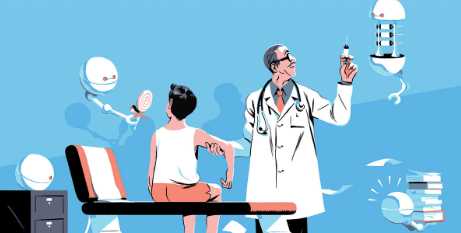Artificial intelligence (AI) has made significant advancements in recent years, with the ability to perform a range of tasks that were once thought to be the exclusive domain of human intelligence. From language translation to image recognition, AI has demonstrated its remarkable potential to automate and streamline a variety of complex tasks. However, there are still some areas where AI cannot replace human expertise, and one of those is the field of medicine. In this blog post, we will explore some of the reasons why AI cannot replace doctors.
Diagnosis and Treatment
One of the main reasons why AI cannot replace doctors is that the diagnosis and treatment of patients require a human touch. Even with the most advanced algorithms, AI is not yet capable of replicating the intuition and experience that doctors bring to the table. Doctors spend years in medical school and residency programs to develop their expertise, and this knowledge cannot be replicated by a machine.
Diagnosis and treatment also involve complex decision-making that requires a deep understanding of a patient's medical history, lifestyle, and emotional state. AI can analyze data and identify patterns, but it cannot make subjective judgments or take into account the nuances of a patient's individual circumstances. In addition, a doctor's ability to communicate with patients, provide emotional support, and explain complex medical concepts is critical to their overall care and recovery. AI lacks the empathy and compassion that human doctors possess, which is essential for building trust and providing high-quality care.
Medical Ethics and Legal Issues
Another reason why AI cannot replace doctors is that the field of medicine is highly regulated and requires a thorough understanding of medical ethics and legal issues. Medical professionals are required to adhere to strict codes of conduct and follow a set of rules and regulations to ensure that patient care is safe and ethical. While AI can analyze data and make recommendations based on established protocols, it cannot be held accountable for ethical or legal violations.
Moreover, medical decision-making involves a degree of uncertainty, and doctors must weigh the risks and benefits of different treatment options. They must also take into account a patient's preferences and values when making decisions about their care. AI lacks the capacity to understand the nuances of these complex issues, and cannot be relied upon to make ethical or legal decisions that affect patient care.
Human Interaction
One of the most significant limitations of AI is that it lacks the ability to interact with patients on a human level. A doctor's ability to build trust, provide emotional support, and establish a rapport with patients is critical to their overall care and recovery. Patients need to feel heard, understood, and supported throughout their medical journey, and AI simply cannot provide the level of human interaction that is required.
In addition, patients often have a range of emotions and concerns that go beyond their medical condition. Doctors must be able to identify and address these emotional needs, which is not something that AI is equipped to do. Patients also require reassurance, empathy, and a sense of connection with their medical providers, which is not something that can be replicated by a machine.
Medical Complexity
Finally, the field of medicine is incredibly complex and dynamic, with new research and discoveries being made every day. Doctors must stay up to date on the latest medical advancements, understand how to interpret complex medical data, and be able to apply this knowledge in a clinical setting. While AI can help with certain tasks, such as analyzing medical images or identifying potential drug interactions, it cannot replicate the expertise and experience of a human doctor.
Medical complexity also requires a high degree of collaboration and teamwork. Doctors must work together with other medical professionals, such as nurses, therapists, and pharmacists, to provide comprehensive and coordinated care. AI simply cannot replace the importance of human collaboration and teamwork, which is essential for providing high-quality care.




Leave Comment